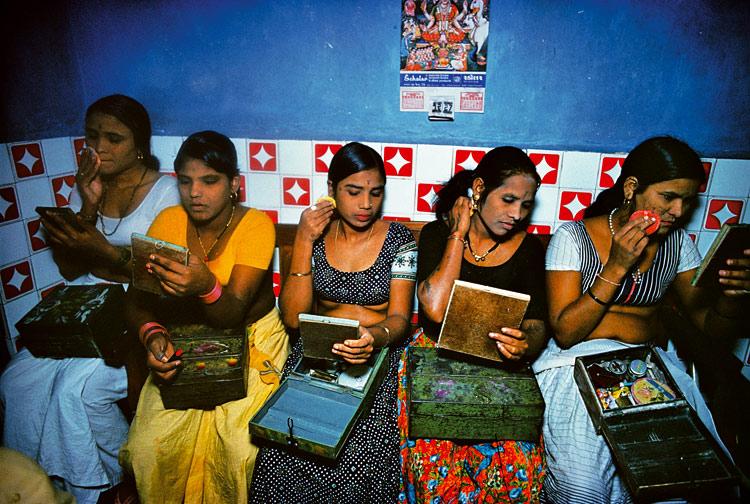Numerous people have denounced the morality of consumption of alcohol and prostitution based on the social and religious grounds, that they are wicked establishments. However, it would be no wrong to say that the business of two was never eliminated from the society. Barring alcohol in Gujrat could not stop the inner instincts of people from consuming alcohol. Rather, the commercialisation of alcohol hiked in Daman and Diu, which became the alternative spot for the easy access to alcohol for people of Gujrat and in fact, acted as a catalyst for economic growth. Similarly, the attempt to prohibit and criminalise prostitution can never be the solution of limiting or eradicating sex services.
The business of prostitution has been prevailing in the society for centuries and will continue to exist whether the governments recognise it or not. Even if talking in the Indian context, it is evident to say that prostitution has been one of the oldest professions practised in our society, mythological book Mahabharata and Vedas (the earliest of the known Indian literature) being the source for references. Starting from the ancient period of Mahabharata and Ramayana, there are many insights of the existence of organised brothels with high-class prostitutes. Known as Devadasis or Apsaras, Mahabharata has recorded about forty, some being named as Urvashi, Menaka, and Rambha. Not limited to the mythology, the existence of prostitution can be traced back to the archaeological findings of the Indus Valley, where a bronze figure of a dancing girl from Mohenjodaro represents a revered prostitute carrying out her duties within the premises of the temple.
From ancient India to Modern India, nothing has changed but just our attitudes which have turned a revered ‘Apsara’ to a prostitute. Earlier, sex workers lived a dignified life unlike today, where a prostitute is considered a black spot on the society; humiliated; and people cramp eyes upon their outcries for support.
Advocating the legalisation of prostitution can certainly be not justified by referring to the old practices by our ancestors, because not every practice was right, like ‘Sati Pratha’. But something that is a part of daily life because of the never-dying human tendencies, should be accepted and regulated with defined protocols under the vigilance of government. Looking at the poor condition of prostitutes, the time demands a different perspective towards this taboo.
After African countries, India is labelled to have the highest number of HIV/AIDS positive sufferers, blaming prostitution to be the origin of widespread. According to the International AIDS Conference 2017, transmission of sexually transmitted diseases could be controlled up to 33 to 46 per cent if prostitution was legalised. According to the reports from the conference, prostitutes fear of getting caught by the law enforcement, which restricts them from consulting health advisories or availing the basic health amenities when infected by STDs such as HIV and AIDS. But if prostitution is legalised, then sex-workers would be asked for registration and be medically examined regularly; and if found HIV positive, the registration would be cancelled to avoid the widespread of the virus.
Marijuana should be legalised for medical purposes in India: Maneka Gandhi
Many countries around the globe have legalised prostitution and even allow to run brothels. Netherlands, Denmark, Germany are some of the best examples to look at, which have the state governed prostitution. These countries register the prostitutes, put an age limit of minimum 18years and keep their health and criminal records. Licensing of brothels and prostitutes also helps in tracking the number of people being abducted for this particular profession. In India, it is officially illegal but the corruption finds its way out to exercise its favour. In order to curb down this corruption, the best way is it to bring the profession on the front end, in a systematic, regularised and organised manner. This can help in resolving many women-centric issues, human trafficking of women and children being one of the major concerns.
Since a woman is a vulnerable sex, easy to be exploited and abused, people find it easier to execute their physical strength and sexual enforcement on women. But Dutch cities found a sigh of relief on recording 32 to 40 per cent reduction in rape and sexual abuses within two years of the legalisation of prostitution. Thus if prostitution is legalised in India, there is a great possibility of a reduction in rape, sexual violence and other sex crimes. People who wish to satisfy their sexual urges would have their options readily available to them. Rather than committing rapes, they could just hire a prostitute to satisfy their sexual needs. Moreover, this legalisation will enable sex workers to approach police in case any violence is committed against them.
Reports say, India leads the world in modern slavery
If India can take inspiration from many other countries in forming its law, then it can even adapt the system of legalising sex-work. The rights of sex workers will be acknowledged and their work will be considered as a dignified profession just like any other, for which money is exchanged for the services given. A code of conduct by the governing authorities and policymakers will allow definite prerogatives and rights for the protection of sex workers, successful practice of their trade and overall proper execution of the profession. In order to exterminate many women-centric issues, it is high time that we validate prostitution and brothels, keeping in mind that prostitution continued from ancient and medieval India and will definitely take a gigantic outlook in modern India.
Disclaimer: The opinions expressed in this article are the personal opinions of the author. The facts and opinions appearing in the article do not reflect the views of NEWSD and NEWSD does not assume any responsibility or liability for the same.


















